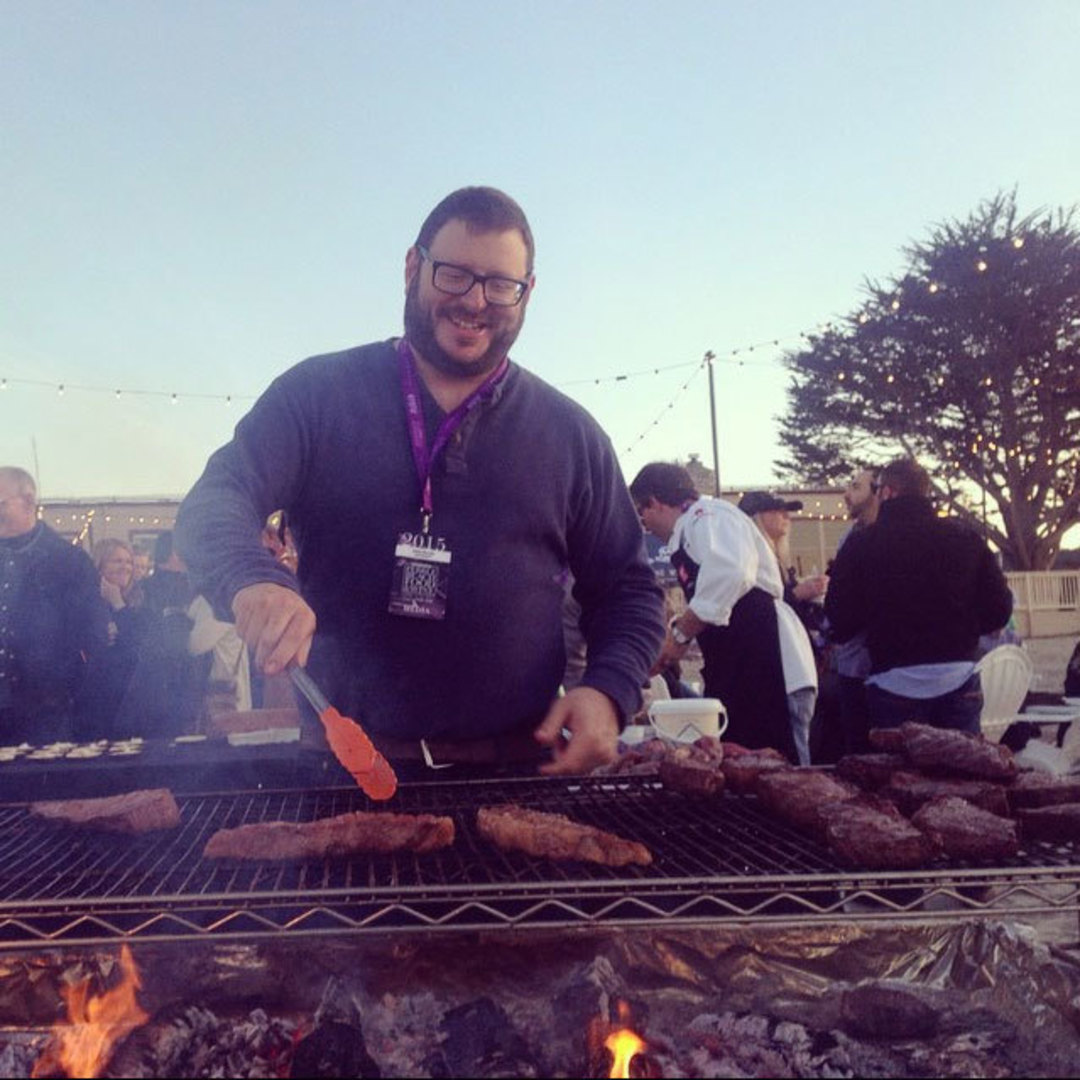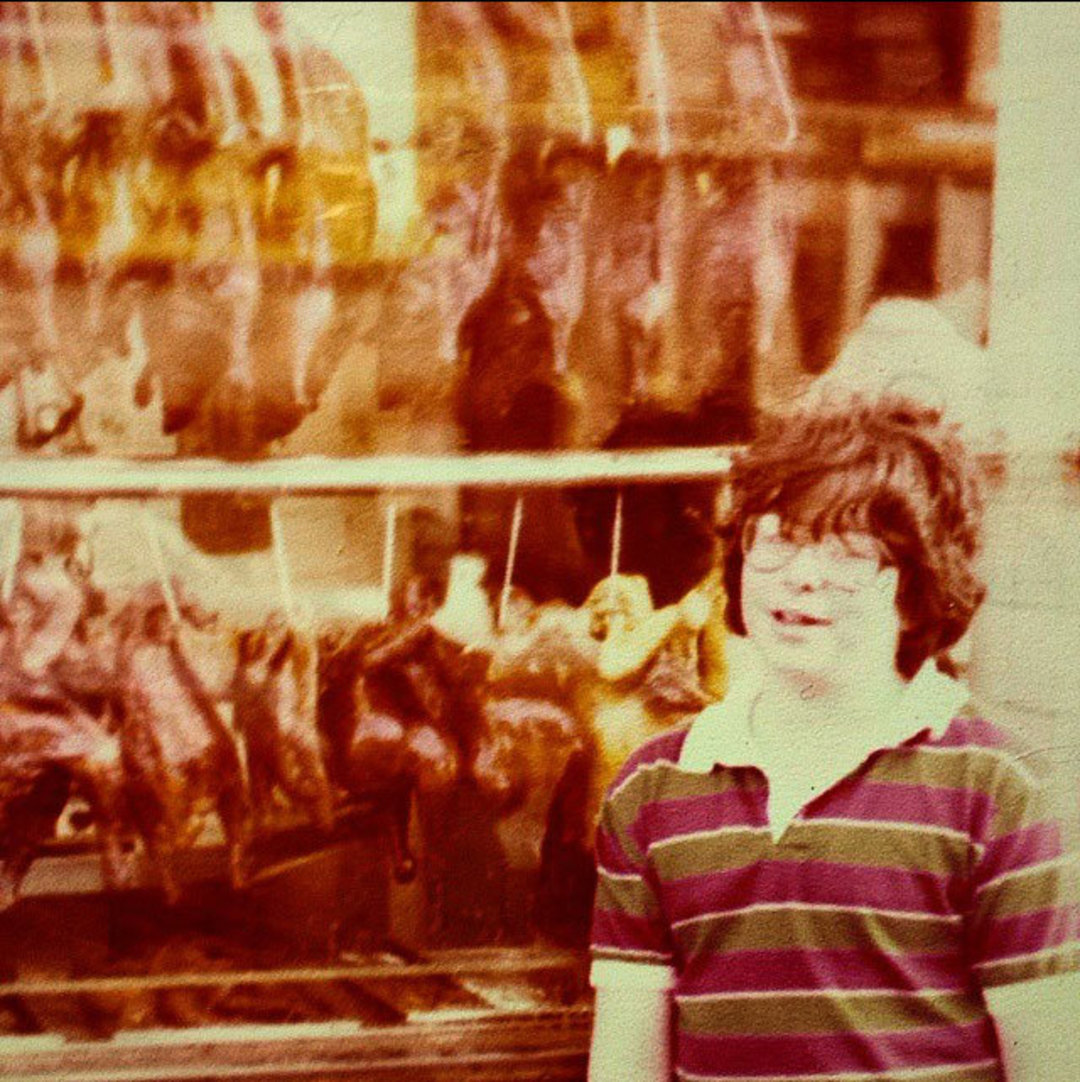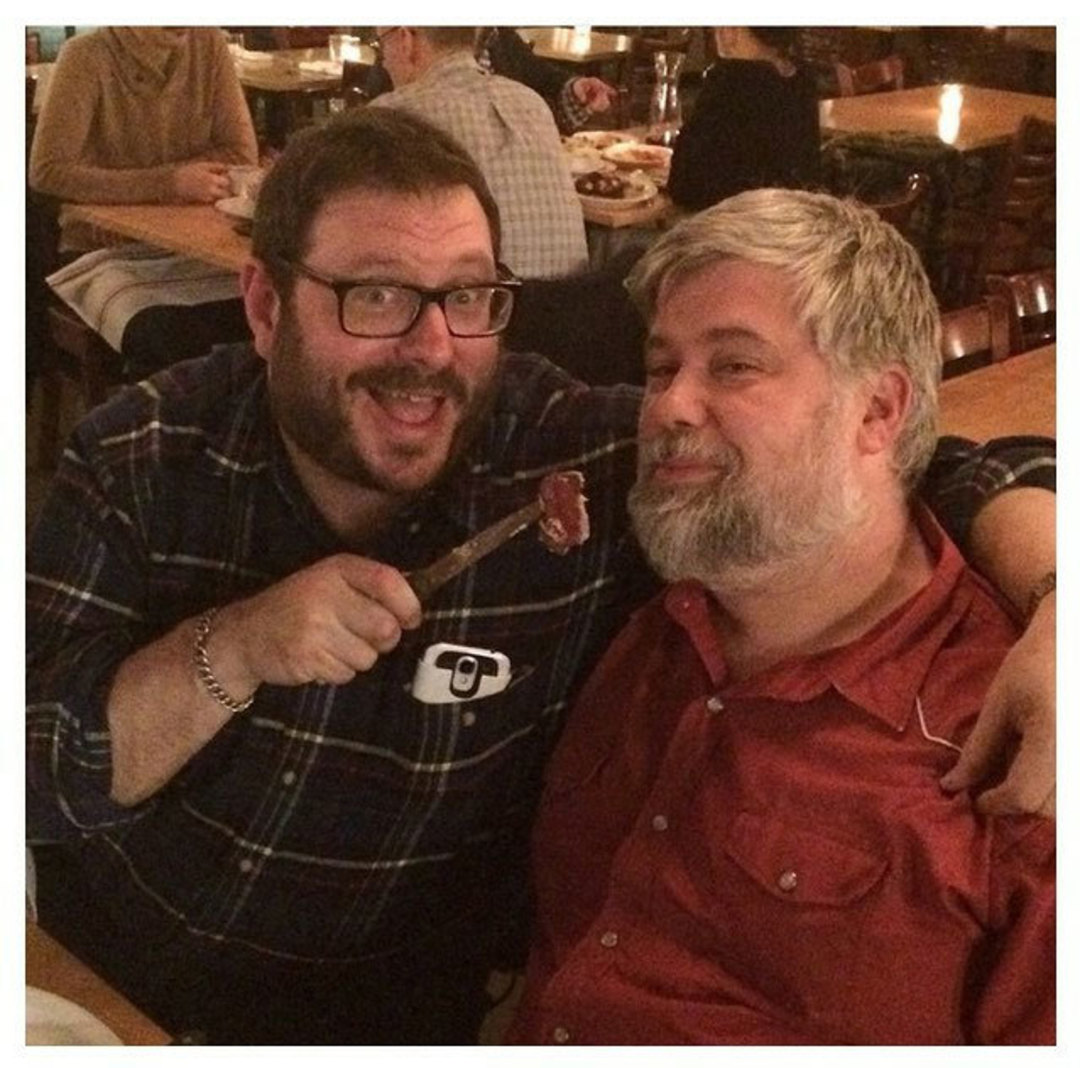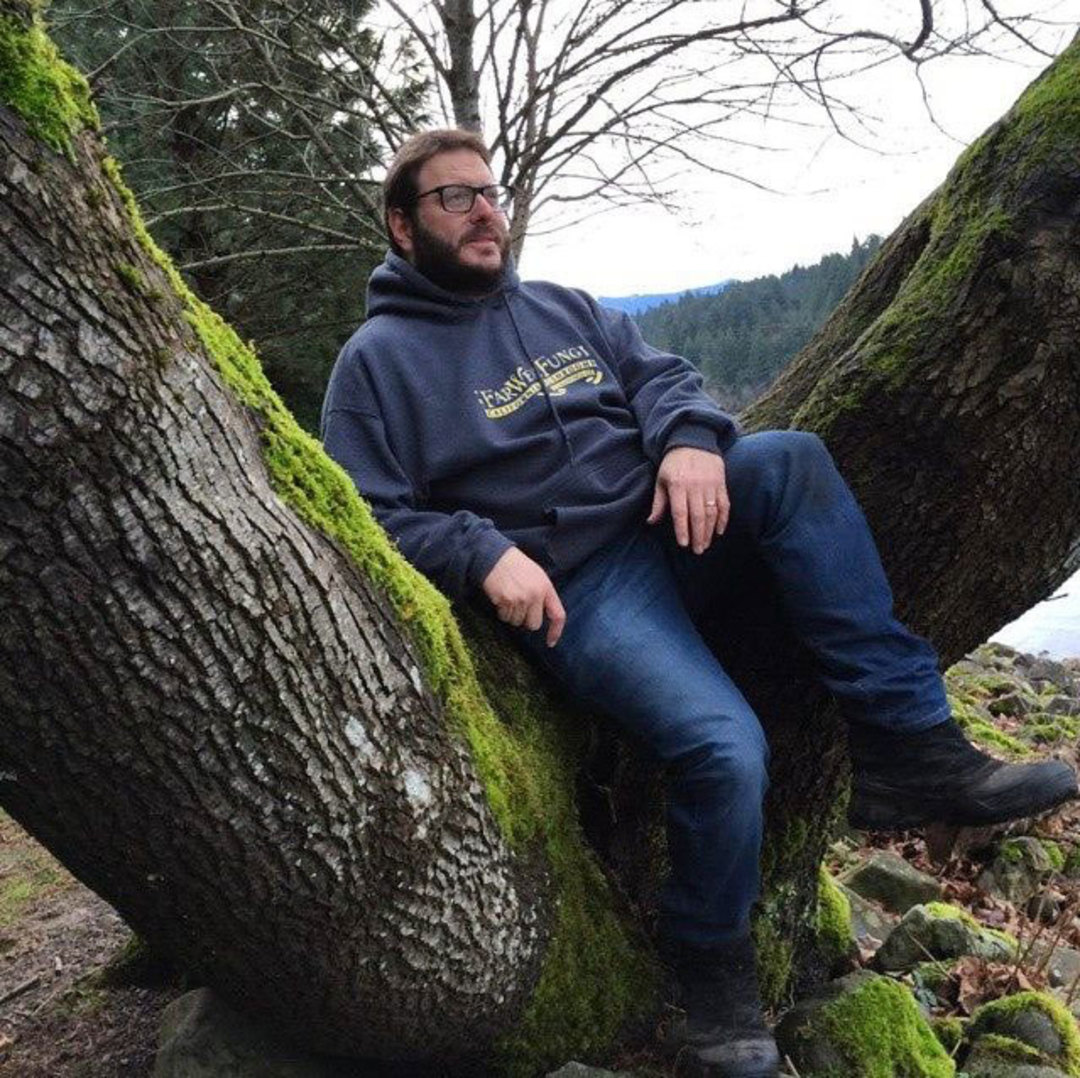Why Josh Ozersky Was America's Most Original Food Writer

Ozersky grilling at 2015’s Meatopia Pebble Beach. His 10-year-old event, which he called “The Woodstock of Edible Animals,” invited chefs to create altars of meat with only wood, coals and fire. Photo: Mika Parades
This is what you need to know about Josh Ozersky: He was larger than life, in every sense, with a rapacious imagination and unstoppable appetite for meat cooked to exacting perfection with little more than fire, cast iron, and salt. As Esquire’s food critic, author of books on Colonel Saunders and hamburger history, and the James Beard-winning founder of New York’s proto food blog, Grub Street, Ozersky attacked food culture with the kind of insightful voice and potent sentences that have largely died in American food writing.
He stood for things, unapologetically, with his own culinary moral compass (though he was far from morally perfect). He called the restaurant world’s move towards “composed food” an American culinary crisis: “I’m asking our chefs to cook, really cook, and if they can’t do it, I’m hoping someone else can. Because I really miss it.” And, alarmed by the rise of fancy desserts, he recently proclaimed “Dessert is Pointless: How to Fix the American Dessert Death.” He took us places. His self-exile from New York’s rent-soaring East Village, a glutton’s paradise where he roamed for years as the king of Avenue C, to “vanilla” Brooklyn, a journey etched in hilarious melancholy, is a must read, as is the angry reader response.
To be sure, he divided as many readers as he conquered. And when he died, suddenly, shockingly, last week at age 47, Ozersky had finally found something he loved as much as an old-school cheeseburger: Portland, Oregon, his home since last December.
In 2010, Ozersky barreled into Portland looking for the culinary equivalent of Elliott Smith, ate until he “writhed in pain” over 36 hours, then, magnificently, captured the essence of an emerging food city in Time magazine, calling it “America’s New Food Eden.” He loved the raw beauty, the lo-fi gastronomy, the communal spirit, the lack of ego and politics, and, mostly, the care and generosity. “This is food for foodies by foodies, made well in very large portions.” He made friends for life on that journey, and in December, he decided to leave the hell of a changing New York for the paradise of Portland. Ozersky, his lovely wife Danit Lidor, and their “son,” a spunky dog name Judah, moved to Mt. Tabor. He was never happier. One night at Ned Ludd, his favorite restaurant in America, the epitome of a fading America in his mind, he put his head in his hands and said, “I hope this never ends.” Sadly, it did, all too soon. I loved him, dearly.
Over the weekend, I asked his Portland posse to share stories about Ozersky. The following is an ad hoc round table with Tommy Habetz (Bunk Sandwiches), Mike Thelin (Feast Portland), Adam Sappington (The Country Cat), Jason French (Ned Ludd), Naomi Pomeroy (Beast and Expatriate) and Mika Paredes (Culinary Director of Ozersky’s Meatopia, confidant, and right-hand gal).
Karen Brooks: Josh has numerous alter egos, like Mr. Cutlets, and great taglines. He once called himself “the Donnie Brasco” of New York’s foodscape. But my favorite sobriquet belongs to Mike Thelin, who dubbed Josh Ozersky “The Hamburger Hemingway.” What a spectacular image.
Mike Thelin: That was one of my two nicknames for Josh. The other was “Culinary Barebacker in Chief,” referring to his no-holds-barred approach to the eating life. He rode without a saddle, drawn to food and cooking in its most elemental forms. He wasn't much for adornment, pomp or ceremony: He found as much to love about sandwiches, Texas barbecue, and fried chicken as he would in any fancy restaurant. This trait is really what set him apart from other national food writers. As for the Hemingway moniker, Josh could have found success writing about any subject. I mean read his stuff! Very few writers out there could tell a story like Josh. But he loved food, and no one more eloquently described the simple and every day, without pretension. Hence, Hamburger Hemingway. He approached hamburgers with the zeal of Hemingway shooting wild game in Africa or running with the bulls in Spain.
KB: A must-read is his essay “My Life in Hamburgers,” in which Josh describes his early relationship with the ground round: “my plump little fingers clenching madly at tiny Royal Castle burgers, digging into the cloud-light bun with the same animal glee with which I plunged my face into the frosting of my first birthday cake.”
Mika Paredes: Alas, as much as he loved Portland, he wasn’t sure he could find his “Ozersky burger heaven” here. It had to be an air-bread bun; a small beef party, not too thick or thin, cooked crusty and rosy; a steamed or raw onion; and American cheese. He liked the new All-Way cheeseburgers. But mostly, Portland burgers were too fancy for Josh.
KB: I first met Josh at Bunk Sandwiches, over lunch with Thelin and visiting chef Shamus Mullen. The scene reminded me of being in the African bush, watching a lion take on a gazelle for dinner. Josh, destroying a Bunk pork belly Cubano, bellowed in the air to no one in particular, “Way WAY better than Miami.” He would know. As he wrote in Esquire: “You can keep the Constitution, the Colt .45, the Internet, and the iPhone: What makes me proudest as an American is our sandwiches.”
Tommy Habetz: He totally got what I was trying to do at Bunk instantaneously. We grew up in the same East Coast sandwich and diner culture. He saw that I was using all of my experience—every technique I learned—to make something new. Bunk. My song to America. We understood sandwiches on the astral plane.

1978, Atlantic City. After his mother died when he was 14, Ozersky told friends he was a friendless child who raised himself. On his abiding interest in food, according to his Wiki page, “... my father and I only spoke about movies and food, and food far more than movies. He was a great gastronome and taught me to self-medicate my loneliness with steaks and sausages."
KB: Josh mostly raised himself, without friends or much parenting. His exaltations of meat were, at times, wrapped in sad, tender truths. After his mother died (he was 14), Josh said his conversations with his father only involved movies and food. Josh called him “a great gastronome who taught me to self-medicate my loneliness with steaks and sausage”; a relationship he poignantly chronicled in "Solitary Man." Yet, Josh loved people, gregariously and loyally. He was the consummate host, the life of the party. What is your memory of meeting him?
Adam Sappington: In 2010, Kaie Wellman (creator of eat.shop.Portland) invited Josh to Portland. The day he visited Country Cat, my wife Jackie called me and said, “Hey. There’s some guy here named Josh Ozersky eating everything on the menu. He’s so loud and obnoxious that people at the tables next to him are leaving.” So I walk in and there sits Josh at the largest table in the house, filled to the edges with fried chicken, chicken-fried steak, meat loaf, bacon, sausage, biscuits and pancakes. I said, “Holy shit. Are you Josh Ozersky?” He said, “You must be Adam. I can tell by the overalls and silver fox hairdo!” The love affair began, with continuous conversations about “lardcore” cooking and frying chicken correctly. He taught me so much about American food, vernacular cooking, and that idea that meat cookery is the quintessential technique that makes a chef “a chef.”
Naomi Pomeroy: He came to Beast, declared his love for “the best lamb hash ever,” and asked me to come to Meatopia (a carnivores-only New York food fest) to cook. The rule of Meatopia was everything had to be cooked on over a live flame. So we built a huge fire on one of the hottest days in New York history. You couldn’t imagine that 3,000 people would gather in this heat to eat meat, without tents, in the middle of Manhattan, but they did. Josh was a king like that. You did what he asked. He declared our dish the “Best Beef Dish of Meatopia.” So that's when we really met him. That was 2011.
KB: Josh’s love of fried chicken is legendary, and all discussions seem to lead him back to the Country Cat.
MT: Josh had just written a book about Colonel Sanders wherein he had discovered the original spice blend that contained the famed secret original "11 herbs and spices" for Kentucky Fried Chicken, and he wanted to try it out. The blend was being sold under the name "99x" by a spice company in the Midwest, and Josh bought a giant sack of 99x to take to the Country Cat so Adam Sappington could try it on the kitchen’s fried chicken.
AS: He called me with the excitement of a 10-year-old getting their first BB gun. “I got the stuff man, I got the stuff!!! It’s fucking amazing. I’ll bring it in and you can make me some when I get to Portland.” Josh was famous for always being overly assuming when it came to people cooking for him. Like, you’ve got nothing better to do. I loved him for that. So I called Thelin and chef Matt Lightner and told them Josh was coming to eat on Sunday night. We called it the “99x dinner.”
MT: Adam cooked a bunch of great food that night, including a scrapple-stuffed pigs face that was like a brilliant American redneck version of a tete de cochon. After baskets of biscuits, the pigs face and other accouterments, a massive platter of fried chicken arrived. It was the best any of us had ever tried. Josh was so caught in the moment that he rather quickly took down five pieces of chicken—four of his own and one from Lightner's plate. I don't think Josh realized how much he had eaten, and said he needed to step outside for an "air bath" (his term for fresh air). Through the window, we saw Josh outside taking deep, slow contemplative breaths like a boxer might before going into a final round. He came back and polished off the lion's share of Jackie Sappington’s pudding and some pie. Another air bath followed. Josh could eat like no one I have ever met, but to call him a glutton would be arrogant. He loved good food. He was an advocate for great food. He was swept away by it.
KB: I feel robbed to think about all the meals and conversations we won’t have. He was a joy to eat with. He loved Ned Ludd’s primitive, wood-fired approach, calling it his favorite restaurant in America right now. He was already uncovering unknown gems, like the genuine hash browns (one of his abiding obsessions) at the Original Dinerant downtown. He called Apizza Scholls as good as anything in New York. He was a fool for lamb at Levant (“masterful”), Olympic Provisions charcuterie and the Ringside’s 1950’s vibe and aged steaks.
MP: I turned him on to lunch at Luce. He called it a mitzvah. But the last meal we shared was at the Sizzler on 82nd Avenue. We met for a business lunch, across from a Wal-Mart. It was completely dead. We had rib eye, salad bar, and sweet tea. It was terrible, but Josh loved it. He wasn’t going ironically—it was nostalgic and comforting for him, a guilty pleasure.
KB: Josh was as passionate about music as food, and many of his conversations revolved around his super eclectic, spot-on Spotify playlists.

Bunk’s Tommy Habetz says he felt an instant kinship with Josh: "The word 'brother' gets used a lot. And coming from a family of six boys, the last thing I wanted was another brother. But, there he was. Just like me, except not afraid to tell the whole truth.”
TH: This is how I'll remember Josh: I invited him and (his wife) Danit down to Bunk Bar to see Jeff the Brotherhood. It was a great night. The Brothers killed it. I turn around and there's Josh, seemingly out of his element, but shining that maniacal punim in total bliss. Meatball hero in one hand, Sazerac Rye in the other.
- Josh: "I've never heard music like this!"
- Bunk’s Matt Brown: “You were never into stoner rock?”
- Josh: "No, I was too busy listening to Gilbert and Sullivan. I love it, you can really feel it in your kishkas!"
I had to look that up. It means "guts" in Yiddish.
NP: My favorite time hanging out with him was in Austin for his "Live Fire" event. We were on our way to a karaoke bar and he couldn't wait! A Bee-Gees song came on the radio and he blasted it, rolled the windows down, and car-danced his way even further into our hearts. For a scruffy, sassy, gravelly New York Jew, he was just so surprisingly sweet. A pain-in the ass sometimes, but one you were always so glad to help. I would have done anything for him. Now I'm in New York cooking for his memorial. One last lamb dish in his honor.

After years of New York’s concrete life, Ozersky loved the idea that he could bolt for the Oregon coast on a whim. Photo: Mika Parades
KB: Why do you think Josh loved Portland?
Jason French: Like so many people, Oregon gave him a sense of calm and being himself that he hadn’t found elsewhere. I was excited to share Oregon with him. I can’t say I was a huge fan of all of his sentiments in writing, and he was certainly polarizing with his views, but he had a huge heart and wanted very badly to just be Josh Ozersky: fan of food and cooking and life.
TH: When Josh moved out here, we were all in a bit of shock. It was like Woody Allen moving to Kalamazoo. But he loved Portand. He dug it—he got it. He honestly believed that Portland was as exciting and important as New York or anywhere. And that should make every single food worker in this city proud. Because Josh Ozersky was the real deal.
KB: What will you remember most about Josh?
MP: I sent him a book called The Way Meat Loves Salt: A Cinderella Tale from the Jewish Tradition. He thought the title was hilarious. Then he made up his own food parables and sent them to me:
Josh Ozersky’s Treasury of Yiddish Food Proverbs
Nobody wants a wet shoe, a homely bride, or a hot chocolate cake.
There are never too many napkins or too many potatoes.
Life is too short for platonic love affairs and savory desserts.
Fire and Meat and Man — and no room for a fourth!
A spoon of cream goes farther than a gallon of skim.
Nobody cares how you made it.
A hamburger with no cheese is like a man with no legs. He can move — but just barely.
All gas grills are vegan at heart.
If you order halibut and your friend gets a steak, how is that his fault?
What sharpness is to steel, and marbling to meat, care is to a cook.
A restaurant should be judged by its best dish on its worst day.
But my favorite it this one: “Never give a child a Hydrox and tell him it's an Oreo.” The idea of deceiving a child with even a generic Oreo was just unacceptable. Real food spoke to Josh in many forms.
